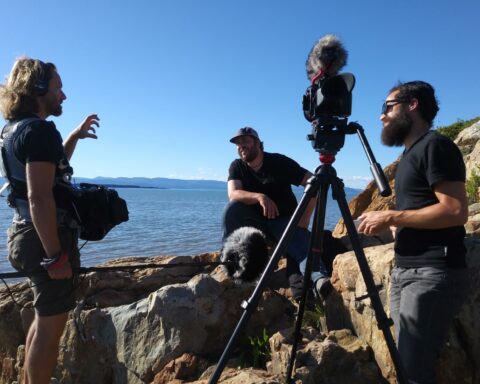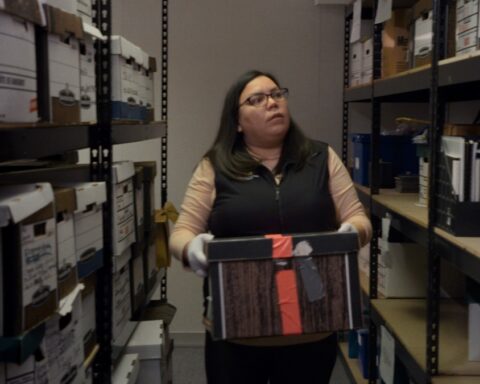Aida’s Secrets
(Israel/Germany/Canada, 90 min.)
Dir. Alon Schwarz, Shaul Schwarz
“From 6,000 survivors, 1,300 babies were born.”—Alon Schwarz about the Jewish survivors of the Bergen-Belsen concentration camp who lived in a Displaced Persons camp after World War Two
Imagine what you would do if you survived a living hell. Would you be concerned about conventional morality? Everyone in power, every institution, had abandoned you to a grisly fate. Yet somehow you didn’t die, perhaps out of luck or because you had a skill that your oppressors valued. With hope abandoned, you did what you could to stay alive until, in a shocking upheaval, you were not only freed but you saw your jailers imprisoned or killed.
That’s what happened to many Jews and Roma and gays and Communists who suffered the fate of being arrested by the Nazis from 1943 to 1945 and sent to the notorious concentration camp Bergen-Belsen. Over 50,000 people died there in less than two years, including most famously the Dutch Jewish memoirist Anne Frank and the anti-Nazi Czech painter and writer Joseph Capek, who invented the word “robot.”
Over 60,000 prisoners were liberated by the British armed forces in April 1945. Those freed, mainly Jews, were placed in Displaced Persons (DP) camps for years as the chaotic conditions of World War Two slowly calmed down and exiled citizens were returned to their homelands. Years passed in which the former concentration camp prisoners were nursed back to health and allowed something they thought they would never experience: freedom. What did the Jews do in DP camps? What did the radicals and the gays and the Roma? What would you do?
One of the survivors of Bergen-Belsen was Aida, a young attractive Jewish Pole. She’s the titular figure in the incisive and very personal documentary, Aida’s Secrets. Thin, glamorous and blonde, Aida gave her son Izak up for adoption to the nearly formed state of Israel. Years later, she arrived for her son’s Bar Mitzvah and remained a loving, enigmatic figure in his life. Even in Israel, Aida kept secrets, letting his adoptive parents and children know that Izak had a blind brother, who had also been born in the D.P. Camp—and that her ex-husband had him.
Filmmakers Alon Schwarz and his brother Shaul, who are Izak’s nephews, were told about their uncle’s brother when they were young but were sworn to secrecy by their grandfather. It took nearly 60 years for Izak to find out enough about his mother for Alon to finally admit that Aida had another son. When Shep, the blind brother, was discovered in Winnipeg, two things were inevitable: Izak would go to meet him and Alon would make a film about it.
If Mike Leigh hadn’t already taken the title, this documentary could be called Secrets and Lies. Aida certainly had many secrets and didn’t seem to have any problem telling lies. And why not? For a period, conventional morality didn’t matter to the survivors of the camps. As the film unfolds, Aida’s reticence allows for the newly united Shep and Izak to join Alon and Shaul to work on uncovering a decades long detective story.
Working with archivists from Canada, the Netherlands, Israel and Germany, the two sets of brothers gradually unearth the secret lives of Aida and Geshel, who became her husband in the D.P. Camp. As Shep and Izak become loving brothers in their sixties, and their aging mother embraces both of them in her nursing home, one thinks that this tangled and entrancing documentary of displaced love is concluding.
Not so. Through archival research and the chance discovery of a scrapbook of photos created by Zippy, a Dutch kindergarten teacher, the conflicting love lives of Aida and Geshel are meticulously recreated. The film implies that there were likely many crazy tales of love among the liberated camp survivors and their German and Dutch nurses and teachers.
Aida’s Secrets is a very cleverly constructed investigation into lives and misdemeanours. The Schwarz brothers use evocative archival footage of home movies and photographs from the late ‘40s accompanied by very engaging jazz music to give a sense of what life was like when Aida was young. A final revelation, uncovered by Shep, only adds to the intrigue circling Aida, who, like many Holocaust survivors pursued her own path throughout her life. If she was hardly the perfect mother, who can blame her?
Aida’s Secrets opens at Hot Docs Ted Rogers Cinema on Jan. 1











